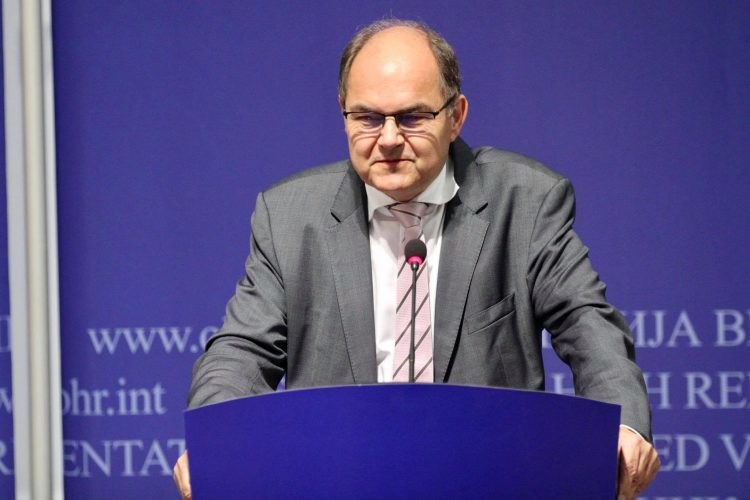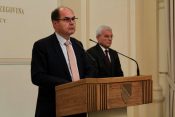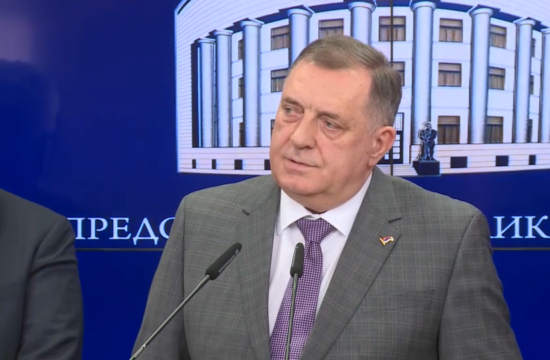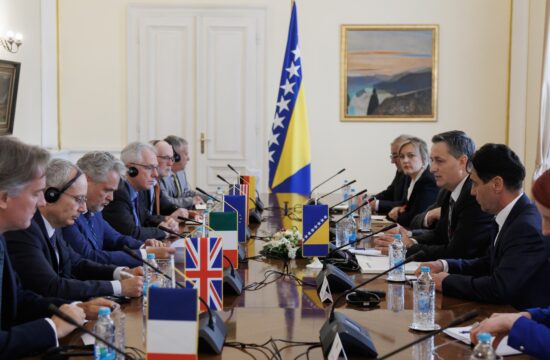
Bosnia and Herzegovina should become a model of a good quality of life if it focuses on a common future instead of divisions, said the new High Representative in BiH, Christian Schmidt, adding that the main priority of local politicians should be getting educated youth back to the country.
Schmidt, the German politician who took over the post of High Representative from Austrian diplomat, Valentin Inzko, a few days ago, is tasked with overseeing the civilian implementation of the 1995 Dayton Peace Agreement.
At a Wednesday press conference, he said that it seems to him that too much time is being wasted on looking at the past in BiH and that there should be more of a focus on the future.
Schmidt said that he is aware that it was not the victims who caused the “difficult history and situation since 1992” in the country.
“People have suffered injustice before as well, and that includes the failure of Europeans and even my predecessors to make a good assessment of the situation in the Balkans,” he said, adding that he wants to be an honest mediator and arguing that it is necessary to understand in the 21st century that history must be accepted and respected as it is and that victims must be respected as well, regardless of their nationality.
Nothing should be more of a priority than looking forward into the future, he said.
“It is clear that every war crime must be sanctioned as every other one was throughout history, regardless of who committed them. We are talking about individual guilt, it is never collective guilt and we cannot speak of it that way. As a German, I know very well what I’m talking about,” he said, calling any glorification of convicted war criminals “unacceptable.”
“Those who want to be part of the European Union must respect European directives,” he said, noting that ‘Memory Laws’ have “long been a standard in the EU” and will be part of the accession talks for Bosnia.
He also mentioned the 14 key priorities the EU defined for the country to achieve candidate status, arguing that “we must focus on resolving the urgent issues that BiH is facing today, and especially stop the departure of young people.”
There are many things that need to be done, Schmidt said, adding that he is willing to use his powers and instruments to “build a brighter future for the citizens of this country.”
The Office of the High Representative (OHR) has an “indisputable legal basis” in the Dayton Agreement, he noted.
“I understand that this is a temporary position until the dysfunctions I mentioned are resolved,” he said, explaining that “we are not waiting for paradise” since no country in Europe has such an ideal situation but that it is important that the country is functional.
The task of politicians in BiH should be to work on getting young people who left the country to return and on preventing more from leaving, he stressed.
“These are people who have good knowledge,” he said, arguing that Bosnia has a good university structure.
“That's what we need to do. That cannot be ordered, it needs to be worked on well and that leads to the functioning of the state,” he said.
Schmidt said it seems that BiH politicians are maintaining a quid-pro-quo policy.
“I want us to have a common interest. You know, I'm not naive. I know very well after 30 years of working in Germany and the EU how complicated things can be,” he said, as he described difficult situations he witnessed in the German parliament in the past.
“I am usually a quiet man and committed to the three constituent peoples being absolutely politically on the same level. I shouldn’t say I’m not anyone’s friend. I would say that I am a political friend of declared Serbs, Bosniaks and Croats and, of course, Others, because you know that there are judgments of the European Court that have not been implemented so far,” he said, referring to European Court of Human Rights rulings which found that Bosnia’s political system is discriminatory as it does not allow members of any ethnic group except for Bosniaks, Serbs and Croats to serve certain posts.
The United States is once again engaged in the Western Balkans, he said, thanking US President Joe Biden for that.
“He understands the situation in the Balkans very well, and we cannot say that about everybody. And the UK, regardless of Brexit, is committed to sticking together with the international community in BiH. You can absolutely count on London, as well as other European capitals,” he said, adding that this is also true for Canada, Turkey, Japan, and Russia.
Nothing can be resolved if there is no willingness to come to an agreement, he said.
Schmidt said that as long as there are requests to discuss issues, he will be willing to do so and that he may help in getting those who have not been talking to each other to start communicating.
“BiH will not become a centralized state, but its functionality must be improved. The state must become a unifying element, it cannot and must not be a threat to any entity or canton, but a common and unifying element,” he said, explaining that he will work on the entities in a way that would make the state function properly.
“We need to strengthen togetherness, focus on common points, not differences,” he concluded.








Kakvo je tvoje mišljenje o ovome?
Budi prvi koji će ostaviti komentar!